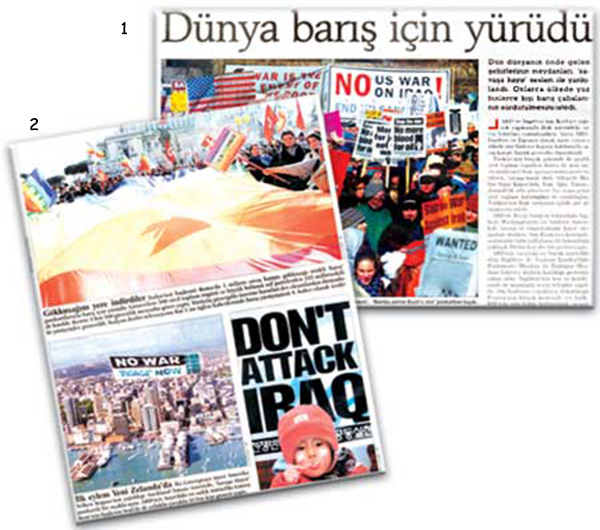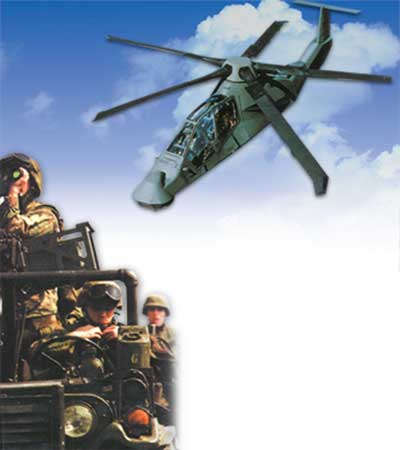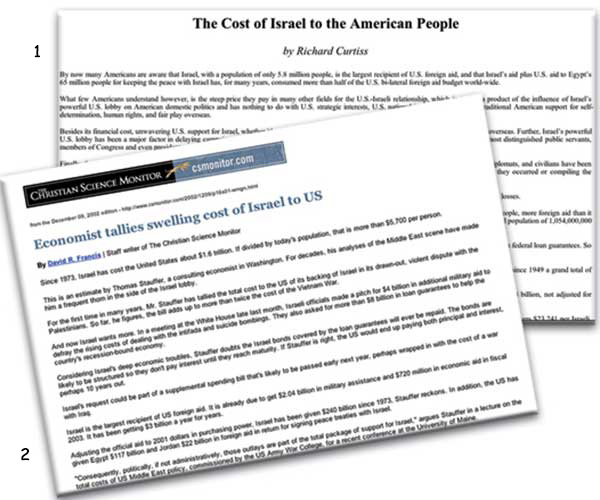The resulting stability in the Islamic world, created by the political and economical cooperation between Muslim nations, will enable the West to establish balanced relations with Muslims.
With the formation of the Turkish Islamic Union, Muslim nations will first resolve their own internal differences and then follow balanced and stable policies toward the external world.
Differences between Muslim nations, as well as tensions between Muslim and non-Muslim nations, will be resolved by the Turkish Islamic Union in a peaceful and just manner.
 |
The artificial tensions between Islam and the West, as well as the "clash of civilizations" scenarios promoted by certain circles, are damaging to the Islamic world and to the West. Thus, the masses live in fear and worry. This situation became more noticeable after 9/11. A large portion of the American people suffers from the psychological effects deriving from the media's ongoing insinuation that "we can be attacked again at any time." The research figures published in the Journal of the American Medical Association by Dr. William E. Schelenger are noteworthy. A survey conducted in Washington, D.C., and New York with 2,273 subjects that sought to measure the effect of 9/11 on the American public yielded the following results:
 | |
| 1. Zaman Gazetesi, 19.1.2003 | 2. Radikal Gazetesi, 16.2.2003 |
| War caused serious divisions in the West, and anti-war demonstrators organized mass demonstrations. | |
The prevalence of probable PTSD (post-traumatic stress disorder) among people who were in New York City on September 11 was 11.2 percent, compared to 4.3 percent for the nation as a whole. . . . In addition, the researchers found that the prevalence of probable PTSD was significantly associated with the number of hours of TV coverage of the attacks that participants reported watching, and with the number of different kinds of potentially traumatic events they reported seeing.44
These figures are only a small example of the damage that tension and conflict inflict upon the human soul. Clearly, it is dangerous to escalate tension and feed people's anxieties.
It is certainly important for the American administration to take the necessary precautions to protect America against attacks as well as to remove any worries in this respect. However, the proposed strategy should not further increase tension, and the public mind should not be left under the impression of constant danger. Policies should evoke calmness and follow peaceful methods.
The best way to relieve the American administration's anxieties, as well as those of the public, is the formation of the Turkish Islamic Union. This event will prevent the efforts of those people and organizations that try to legitimize terrorism by misinterpreting Islam. Moreover, it can reveal that their flawed religious interpretations, which place all Muslims under suspicion, have no validity whatsoever, and thereby prevent any mental confusion among the masses. The effectiveness of the propaganda of those seeking to create tension, as well as their efforts to spread it, will naturally weaken and stall. An environment conducive to compassion, peace, dialogue, and cooperation will be created, and peaceful policies will gain the upper hand.
 |
| It will be proper and conscientious to divert that part of the budget allocated to weaponry to the education of children and poverty. |
America's Post 9/11 policy, especially the invasion of Iraq, caused serious disagreements and a rift in the West. In America, a polarization between the advocates of war and the defenders of peace materialized, and each party accused the other of barbarism or treason.
During the run-up to the invasion and in the post-invasion period, serious disagreements emerged in such international bodies as the UN and the EU, which led some strategists to state that the Western alliance would disintegrate.
For example, millions of people throughout the West and the world demonstrated against the invasion.
All of this could have been prevented by a strong Turkish Islamic Union, which could have rapidly answered the legitimate demands of the West for decommissioning Iraq's alleged weapons of mass destruction and preventing support for terrorism.
Measures taken by the Turkish Islamic Union would have yielded fast results, and the desired results could have been achieved without the resulting military campaign, which caused a massive loss of life and property.
 |
When national budgets are examined, it emerges that their largest component consists of defense and military expenditures. During the twentieth century, 250 small or large-scale wars were fought and 110 million people died. The First World War was fought by 20 countries. Ten million people died, and destruction spread from the front lines and devastated civilian urban areas. History's worst war, the Second World War, was fought by 110 million soldiers, of which 27 million died at the front lines and another 25 million civilians lost their lives. This war devastated tens of countries in an area stretching from the Atlantic to the Pacific oceans.
For instance, 1.5 million homes in Germany were destroyed, leaving 7.5 million people homeless. In addition, 6 million homes were destroyed in the Soviet Union, as well as 1,700 towns and cities, and 70,000 villages.45
Between 1990-2000, 56 armed conflicts broke out in 44 different regions of the world.
In short, the last century was an extremely bloody one. However, these losses increased military investments and inflated national defense budgets even further, instead of becoming a lesson and a cause for peace. The material costs of the twentieth century's major wars was huge: The First World War cost $2,85 trillion, the Second World War cost $4 trillion, the Korean war cost $340 billion, the Suez war cost $13 billion, the Vietnam war cost $720 billion, the Israeli-Arab war cost $21 billion, the Afghan war of 1979-89 cost $116 billion, and the Iraq-Iran war cost $150 billion.46
Throughout this century, military budgets have continued to grow. Reports published in 2002 showed that the world's total military expenditure had reached $1 trillion. In comparison, 1.2 billion people subsist on an income of under $1 per day, 113 million children have no access to education, and every year more than 11 million children die because of poverty and bad living conditions. For the same reasons, one in every 48 children is stillborn.47
America tops the military budget list with an annual $400 billion; a further $45 billion was requested by the Congress for the war on terrorism). This figure is greater than the combined military expenditures of all G8 countries.48 Next comes Russia ($60 billion) and China ($42 billion).49 Furthermore, America has military bases in over 40 countries and a smaller or larger military presence in 132 out of the 190 member states of the UN. Military aid to foreign countries is a significant cost factor in the budgets of Western countries, particularly in the case of America.
 |
| Every year, the American government gives millions of dollars to Israel to establish security and to support it. This is quite normal for nations who are allies. However, a permanent peace in the Middle East will enable such expenses to be lowered so that aid can be increased to such essential social sectors as education, health, and caring for the needy. |
It can be assumed that America's economy can easily absorb such a huge defense budget, but figures reveal that that this expenditure has a considerably negative effect. Consider the following facts: Right now in America, 31 million people—including 12 million children— live under the poverty line; 3% of UShouseholds experience hunger and 7% of US households are at risk of hunger; and a great proportion of them do not receive any state aid. Since 1994, aid to such people has decreased by a third.50
These figures demonstrate the urgency of bringing peace to the world in order to reduce the amount of resources swallowed up by defense budgets. The Turkish Islamic Union will end all conflict and tension within the Islamic world, and thereby create a global atmosphere of peace and contentment that will allow both Muslim and non-Muslim nations to reduce their military expenditures. As a result, the investments made in arms technology and the money spent on arms development will be diverted to education, medicine, science, and culture. Such reductions will enable far greater resources to be used to solve such problems as famine, poverty, ecological damage, and infectious diseases. With the security issues eased, the living standards of all nations will increase and policies designed to improve the quality of life will be implemented. Funds dedicated to cultural and educational projects will increase, and a spiritually healthy, physically strong, compassionate, and loving generation will emerge.
This atmosphere of peace is urgently needed in three problematic areas of the Islamic world: the Balkans, Central Asia, and the Middle East. America has a military presence in all these areas. Every year, it diverts huge funds to Israel because of the Arab-Israeli conflict. The one-sided and strong influence of the Israeli lobby over American foreign policy plays an important role in determining the amount of this aid in the Congress. Research by economist Thomas Stauffer reveals that aid to Israel since 1973 has cost the American people a total of $1.6 trillion. Dividing this amount by America's present population puts this figure at $5,700 per person.51 America can and does help its allies, Israel as well as other countries, but removing the basic justifications for this aid will be a positive development for the American economy and for the future of Israeli citizens. The atheist zionists' foremost propaganda message states that Israel is under constant threat from its neighbors and therefore needs to defend itself. There have been wars and skirmishes between Israel and neighboring Arab countries for decades, and tension still exists between them. However, this situation was not created by just one party to the conflict. Under the influence of atheistic zionism, Israel has often pursued aggressive and antagonistic policies.
It is not difficult to change this situation and allow both peoples to find peace and security. The formation of the Turkish Islamic Union will be an important step toward peace in the region, for it will protect the rights of Christians and Jews living in the Middle East and the rest of the Islamic world, so that the West will have no need to devise separate strategies and commit funds for their protection.
At the beginning of the twentieth century, coal was the single most important source of energy. In the 1950s, coal was replaced by oil. Before the Second World War, industry was driven by steam power, which was fuelled by coal; after that war, oil and combustion engine usage increased dramatically. In the latter part of the twentieth century, natural gas emerged as an alternative energy source and began to play an important role in the world economy.
At present, countries with oil and natural gas reserves are crucial for the world economy in terms of output, political climate, and technological capability. The oil crisis of 1973 showed just how important this energy source was for the global economy. The sudden and sharp rise in oil prices caused global disorder and recession, and similar crises were experienced in the years after this event.
 |
| The global economy depends upon the oil exported from the Islamic world, especially the Gulf region. That region alone contains two-thirds of the world's known oil reserves: Iraq has 11% of the world's oil reserves. The United Arab Emirates has 9.2%, Kuwait has 8.6%, Iran has 13%, and other OPEC countries have 22.6%. In addition, research reveals that the oil exports of the Gulf region will increase by 125% between 2000 and 2020. No doubt, the prevalence of stability and peace in these regions, as well as true democracy, will enable humanity to benefit from these resources in the best way. This is only possible through the establishment of the Turkish Islamic Union. |
For this reason, the Muslim countries' great oil, natural gas, and other valuable mineral reserves play an important role in the West's relationship with Muslim nations. These countries' geopolitical importance is another crucial reason why the West seeks control over these resources and influence in the region. In order to strengthen its position, the West develops a variety of strategies that resemble the colonial mentality of their imperialistic past. These strategies destabilize the region, which, in turn, has a negative impact on the West's interests.
Currently, America consumes approximately 20 million barrels of oil per day. In the 1950s, it produced 52% of the world's output; today, it imports 53% of its own consumption. Research suggests that American reserves will be exhausted within the next 20 years. Given that 24% of its imports come from the Gulf region, this region's importance to America is undeniable. Likewise, the reserves in Central Asia are equally important for America and the world. Europe's dependence upon oil and natural gas from these regions is even greater. As a result of these realities, there is an urgent need for genuine cooperation between the West and the oil-rich countries.
The West must support these countries' cultural and economical development in order to form and sustain such cooperation. The creation of stability, peace, and a functioning democracy in these natural resource-rich regions will enable the world community to benefit from these reserves in the most effective way. Disorder and instability in these regions, on the other hand, will prevent, or at least severely hamper, the extraction, production, and delivery of these resources to other countries. In times of conflict, security issues make it very hard to acquire these natural resources. For the same reasons, delivering these resources becomes even more problematic and more expensive, for longer transport routes have to be established. Establishing the Turkish Islamic Union will resolve all of these issues within a framework of security.
The Turkish Islamic Union will contribute to developing a model that will use all of these energy resources in the most effective way without harming any country. Muslim countries will move as part of an economic alliance, just as they will do in all other areas, and will develop common policies on resource usage. As this union will prevent regimes from disrupting these policies, which are based upon justice, the pursuit of stable and balanced policies on crucial economic matters, particularly oil production and pricing, will become possible.
Every country develops and follows a foreign policy with its own interests at heart in an attempt to benefit its people and its nation's future. However, this is done with the understanding that no country transgresses against or harms the interests of another. The same is true for the West's relationship with Muslim countries. From time to time, some Western countries develop policies in relation to the Islamic world that have nothing but their own interests at heart, even at the cost of the Islamic world's most basic needs. This, in turn, creates anti-Western sentiments among certain circles of Muslims and a mutual distrust and anxiety between civilizations. In reality, both parties' fears and worries can be resolved.
However, this requires Western governments, particularly the American, to be wary of certain powerful circles' influence and desire for a clash of civilizations. These circles can be defined as follows:
 |
| Western imperialists, who sawsome nations as "primitive" and "unevolved," received support from Darwinism. According to this misguided theory, some nations, including the Aborigines of Australia, could not complete their development and thus were supposedly inferior to the white race. |
This mentality, which considers non-Western civilizations to be primitive, was the dominant view in the nineteenth and early twentieth centuries. Supposedly, it was scientifically justified by Darwin's theory of evolution; however, in reality, it is a remnant of colonialism. As we know, Darwin claimed that humanity and apes evolved from the same ancestor and that there were great differences between the races, for some were highly evolved while others were still "half-apes."
This theory was widely recognized at the time of its formulation, but has been disproved by the strong scientific data obtained over the past few decades. Western imperialists used Darwin's so-called scientific claims to justify their exploitation and even enslavement of other nations. Claiming that the white race was superior to the "lower races struggling for survival," they tried to legitimize their policies of colonization and imperialism. While colonization was continuing at a rapid pace, colonialists were claiming to bring civilization to these nations. After a while, however, scientific advancements exposed Darwin's theory as lacking scientific substance and as nothing more than a myth. It also became clear that imperialists brought exploitation and misery, rather than civilization, to the lands they colonized. Still, the effects and remnants of the imperialist mentality and Darwinist logic continue to exist, albeit on a much smaller scale.
At the present time, certain circles in the West, under the influence of such flawed reasoning, set out from the premise of their race's and civilization's superiority when determining how the West will relate with the rest of the world. Of course, this is a great error that will only cause more tension and worsen existing problems. Both the Western and the Islamic civilizations are anchored in history, and both have influenced one another deeply. Moreover, the differences existing between civilizations should not be used as fodder for satisfying superiority complexes or, for that matter, as a source of conflict. To the contrary, the two civilizations should be seen as complementary and helpful to one another. Furthermore, all proposals made by the representatives of the military-industrial interest groups should be received cautiously, for they see international tension as a potential market and a source of economic gain—even at the cost of human lives.
Christianity is a religion of peace and love, for the Bible commands Christians to love even their enemies and to do good for people. Many Christians follow this advice and live peacefully. Most churches and religious leaders in America fall within these parameters. However, some other Christian leaders have preserved their Crusader instincts, as reflected in their aggressive and unjustified comments against Islam. On the one hand, they wrong the Muslims with their comments and, on the other, misrepresent the Old Testament by suggesting that there will soon be a war between Muslims and the West—and, even worse, that this war is necessary. These Christian faults reflect a strategic vision in line with some radical zionist elements in Israel, and their error must be explained to them by fellow Christians.
 |
| The Kach, a radical organization established by Rabbi Meir Kahane in Israel that operates in America under the name of the Jewish Defence League, carried out activities against Muslims in Palestine. Kach embraces some fanatical ideas, among them the idea that Jews are superior to all other people and that all non-Jews are animals (goyim). For this very reason, they advocate the ethnic cleansing of all Arabs in all lands ruled and occupied by Israel. The murder of 67 Muslim worshippers, along with the wounding of 300 others, in the Ibrahim Mosque in 1994 was just one of this fanatic group's deeds. |
Among those who desire such a "crusade" against Islam, some radical Israeli politicians and the like-minded Israeli lobby in America are the keenest. Instead of withdrawing from the Occupied Territories and making peace with the Arabs, they believe that Israel must continue its hard-line policies uncompromisingly. As the "Iron Wall" strategy proposed in the 1920s by the fascist zionist leader Jabotinsky requires, they would like to see Israel as a modern day Sparta 52 with America financing this war machine.
The American administration must be very cautious in its dealings with this radical view. However, there are orthodox Jews who demand that Israel defend peace, as true Judaism requires, and who advocate peace between Jews and Arabs. They must stand up to this radical movement and stop those who wish to drag the world into conflict from doing so.
As for the Islamic world, the most fundamental issue is to establish a union. Given the current lack of a central authority that represents all Muslim countries, the West finds it very difficult to establish a civilizational dialogue on a sure footing.
Sometimes, exceptional actions are blamed on Muslims in general, and, at other times, issues concerning the Islamic world are treated as isolated incidents. Hence, the resulting wrong strategies and harmful incidents cause tension in the Islamic world as well as disorder in the West.
Not having a central institution to protect the rights of Muslims, express their joint decisions and demands, and provide guidance for the West causes great difficulties. Thus, the necessity of our proposed Turkish Islamic Union becomes apparent once more.
44. "Study Shows New Yorkers Suffered Most Post-9/11 Psychological Stress," Scientific American (August 7, 2002).
45. Kemal Girgin and Isik Birben, 21. Yuzyil Perspektifinde Dunya Siyaseti (World politics in the Light of Twenty-first Century) (Istanbul: 2002), 25.
46. Ibid., 30.
47. UNDP 2002 Annual Report.
48. "Global Issues That Affect Everyone," http://globalissues.org/Geopolitics/ArmsTrade/ Spending.asp
49. Military Budgets of Selected Countries, 2001. Online at: www.infoplease.com/ipa/A0904504.html.
50. USDA (United States Department of Agriculture) report.
51. David R. Francis, "Economist Tallies swelling cost of Israel to US," The Christian Science Monitor December 9, 2002.
52. The Spartan state, adopted as a role model by all fascist systems, was founded as a military state by the lawmaker Lycurgos around the 8th century bce. Sparta was literally a state of war and violence.